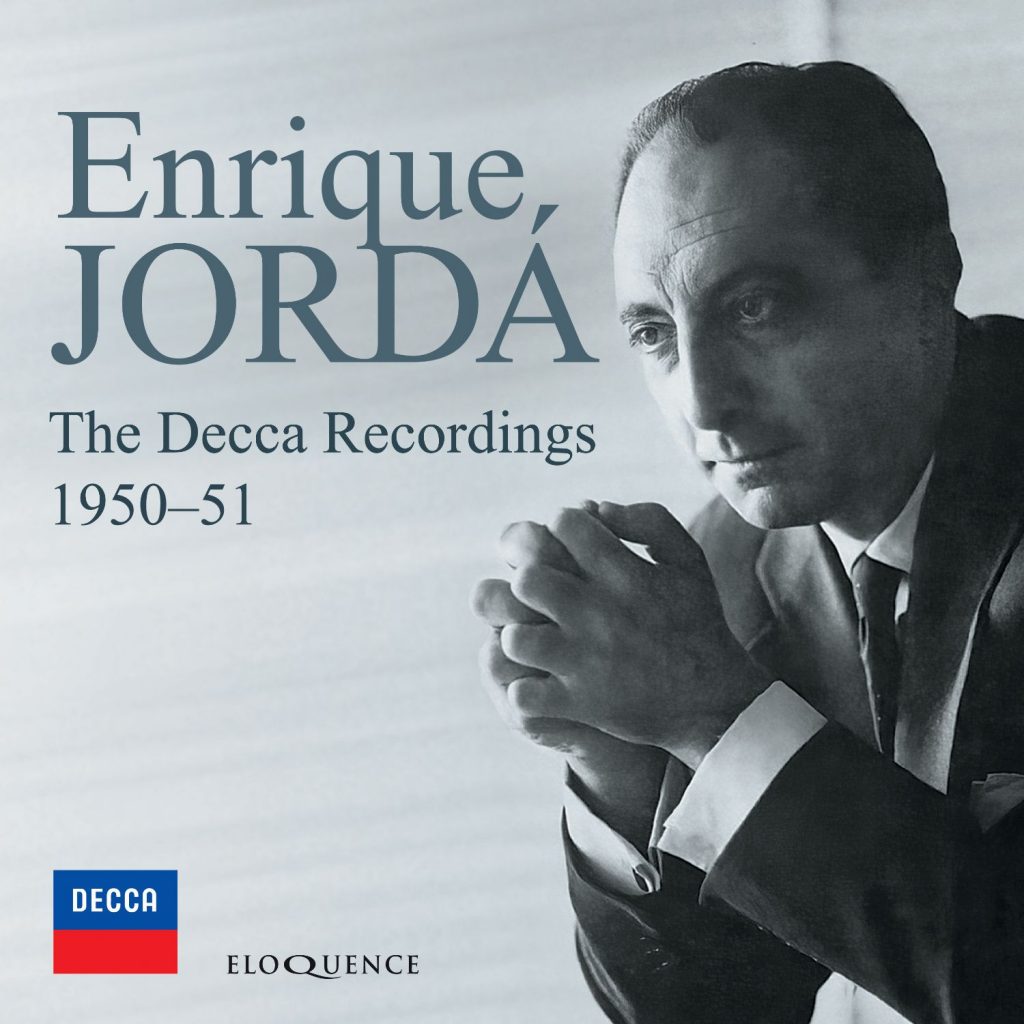
A new collection of Decca’s legendary ‘ffrr’ recordings from the early 1950s, made by an underrated Spanish master of orchestral colour in London and Paris. Includes several items new to CD.
Enrique Jordá described conducting as a ‘hair-raising’ business, and his career never recovered from a very public dressing-down by George Szell while music director of the San Francisco Symphony in the early 1960s. However, he was a true podium artist, lithe and mobile in action, who could draw upon a remarkably broad palette of orchestral colours. Decca’s ‘full frequency range recording’ technology was the perfect vehicle for conveying them to the ears of listeners at home. Though he made his best recordings for Decca, there were only two complete LPs, both of them reissued here, of Dvořák’s ‘New World’ Symphony (July 1951) and bonnes bouches by Jordá’s compatriots Albéniz, Falla, Granados and Turina (February 1950).
The Dvořák was made in London with the New Symphony Orchestra at the same time as Jordá’s second recording of Falla’s Nights in the Gardens of Spain with Clifford Curzon the soloist: an account which has often been praised for its subtle shifts of mood. The Spanish pieces were recorded in Paris with the Conservatoire orchestra, alongside pieces that showed how unfairly limiting was Jordá’s reputation as a Spanish specialist. There are virtuoso but accurate and unflashy accounts of The Sorcerer’s Apprentice alongside showpieces by Glinka and Chabrier, initially issued together on a 10-inch LP, never previously released complete on CD. Also from the Paris sessions, Jordá secures edge-of-seat playing and potent atmosphere in Tchaikovsky’s dark fantasia after Dante, Francesca da Rimini.
CD 1
PAUL DUKAS (1865–1935)
1 L’Apprenti sorcier
MIKHAIL GLINKA (1804–1857)
2 Ruslan and Lyudmila – Overture
EMMANUEL CHABRIER (1841–1894)
3 Danse slave (from Le Roi malgré lui)
MANUEL DE FALLA (1876–1946)
4 Danza Española (from La Vida breve)
ENRIQUE GRANADOS (1867–1916)
5–7 Danzas Españolas, Op. 37 Nos. 5, 2 & 6
JOAQUÍN TURINA (1882–1949)
8–9 La Procesión del Rocio – Symphonic Poem, Op. 9
ISAAC ALBÉNIZ (1860–1909)
Iberia (orchestrated by Arbós)
10 Book I No. 2: El Puerto
11 Book II No. 3: Triana
PYOTR ILYICH TCHAIKOVSKY (1840–1893)
12 Francesca da Rimini, Op. 32
L’Orchestre de la Société des Concerts du Conservatoire de Paris
CD 2
MANUEL DE FALLA (1876–1946)
1–3 Noches en los Jardines de España
Clifford Curzon, piano
ANTONÍN DVOŘÁK (1841–1904)
4–7 Symphony No. 9 in E minor, Op. 95 ‘From the New World’*
New Symphony Orchestra of London
Enrique Jordá
*FIRST CD RELEASE ON DECCA
Recording Producers: unknown (Dukas, Glinka, Chabrier, Falla: La Vida breve, Granados, Turina, Albéniz, Tchaikovsky); John Culshaw (Falla: Noches en los Jardines de España, Dvořák)
Balance Engineers: unknown (Dukas, Glinka, Chabrier, Falla: La Vida breve, Granados, Turina, Albéniz, Tchaikovsky); Kenneth Wilkinson (Falla: Noches en los Jardines de España, Dvořák)
Recording Locations: La Maison de la Mutualité, Paris, France, 24 February 1950 (Dukas, Glinka, Chabrier, Tchaikovsky), 28 February 1950 (Falla: La Vida breve, Granados, Turina, Albéniz); Kingsway Hall, London, UK, 2 July 1951 (Falla: Noches en los Jardines de España, Dvořák)
Remastering Engineer: Chris Bernauer
Original Decca Releases: LX 3013 (Dukas, Glinka, Chabrier): October 1950; LXT 2521 (Falla: La Vida breve, Granados, Turina, Albéniz – released as ‘Music of Spain’): October 1950; LXT 2531 (Tchaikovsky): October 1950; LXT 2621 (Falla: Noches en los Jardines de España): September 1951; LXT 2608 (Dvořák): September 1951
“Mastery of the involutions of Spanish rhythms makes mastery of the healthier Czech meters easy, and the very talented Spaniard Jorda gives us here the most rousing performance on records, variation without diffusion, nuance without affectation.” High Fidelity, Spring 1952 (Dvořák)
“The new Nights in the Garden of Spain will be the touchstone by which future performances must be judged.” High Fidelity, Spring 1952
“A stunning Sorcier … The Glinka is just as alert and satisfying … The whole thing ripples along perfectly. A very old gentleman to whom I played it said it reminded him of the Empire in palmy days; this made me wish that I, too, were an octogenarian.” Gramophone, November 1950 (Dukas, Glinka, Chabrier)
“Splendid recording … I strongly recommend it for our English climate … This rich record holds many delights.’ Gramophone, November 1950 (‘Music from Spain’)

